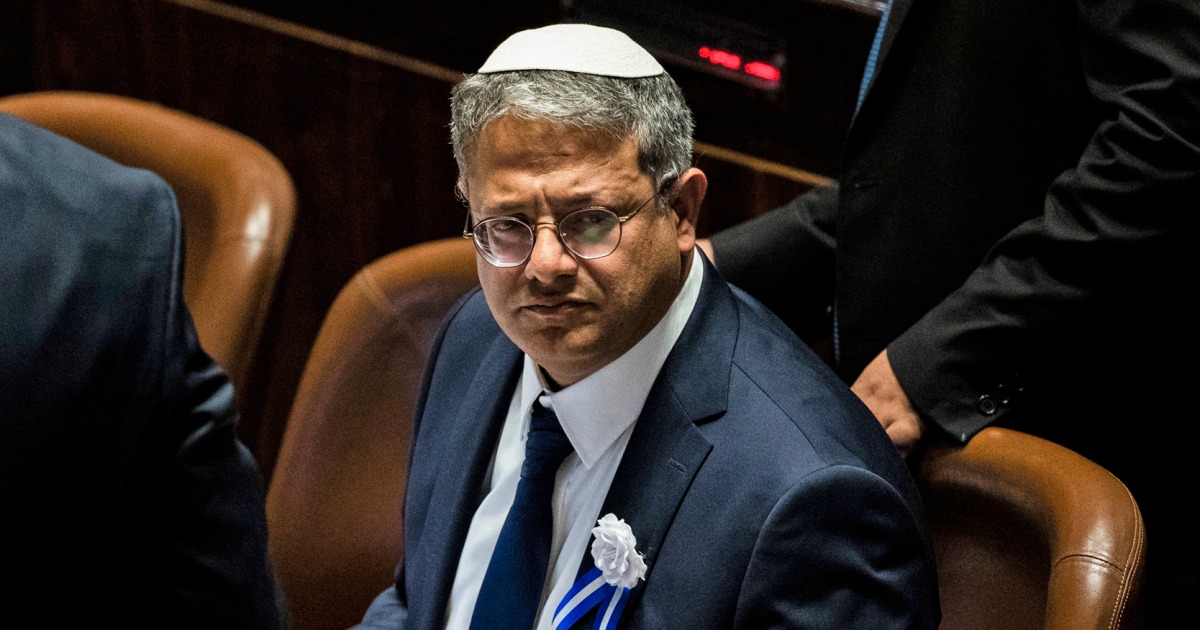An ultra-nationalist Israeli cabinet minister visited a Jerusalem holy site on Tuesday for the first time since taking office in Prime Minister Benjamin Netanyahu’s new far-right government last week.
The visit is seen by Palestinians as a provocation and drew fierce condemnation from across the Arab world and a rebuke from Israeli allies.
Hours earlier, Palestinian officials said a 15-year-old boy was shot dead by the Israeli army near the occupied West Bank city of Bethlehem. The Israeli army said its forces had fired on a person involved in violent clashes with soldiers.
In Jerusalem, Itamar Ben-Gvir entered the site known to Jews as the Temple Mount and to Muslims as the Noble Sanctuary flanked by a large contingent of policemen.
Ben-Gvir has long called for greater Jewish access to the holy site, which Palestinians see as a provocation and a possible precursor to Israel taking full control of the compound. Most rabbis forbid Jews from praying at the site, but in recent years there has been a growing movement of Jews supporting worship there.
The site has been the scene of frequent clashes between Palestinian protesters and Israeli security forces, most recently in April last year.
The US Embassy in Jerusalem said that Ambassador Thomas Nides “has been very clear in discussions with the Israeli government on the issue of preserving the status quo at the holy sites in Jerusalem. Actions that prevent that are unacceptable.”
The United Arab Emirates, which diplomatically recognized Israel in 2020, “strongly condemned the assault on the Al-Aqsa Mosque courtyard by an Israeli minister under the protection of Israeli forces.”
A Foreign Ministry statement urged Israel to «stop the serious and provocative violations taking place there.» The ministry also «called on the Israeli authorities to take responsibility for reducing escalation and instability in the region.»
Bahrain, which also recognized Israel at the same time, did not immediately acknowledge the incident.
A separate statement from the Saudi Foreign Ministry also condemned the Israeli minister’s action, as did statements by Kuwait and Qatar, which do not diplomatically recognize Israel over its occupation of land sought by the Palestinians for a future state.
The Hashemite Kingdom of Jordan, which acts as custodian of the disputed shrine, condemned Ben-Gvir’s visit «in the strongest terms.» Egypt warned against the «negative repercussions of such measures on security and stability in the occupied territories and the region, and on the future of the peace process.»
Ben-Gvir’s declared intention to visit the site earlier this week prompted threats from the Islamic militant group Hamas.
Ben-Gvir wrote on Twitter after his visit that the site «is open to all and if Hamas thinks that if it threatens me it will deter me, you need to understand that times have changed.»
Hamas spokesman Hazem Qassem said that Ben-Gvir entering the site on Tuesday was «a continuation of the Zionist occupation’s aggression on our holy places and the war against our Arab identity.»
«Our Palestinian people will continue to defend their holy sites and the Al-Aqsa Mosque,» he said.
Ofir Gendelman, who has long served as Prime Minister Benjamin Netanyahu’s Arabic-language spokesman, posted a video showing that the «situation is completely calm» at the holy site following Ben-Gvir’s departure.
The hilltop shrine is the third holiest site in Islam and an emotional symbol for Palestinians. It sits on a sprawling esplanade that is also the holiest place for Jews, who call it the Temple Mount because it was the location of two Jewish temples in ancient times.
The site’s competing claims lie at the heart of the Israeli-Palestinian conflict and have sparked numerous rounds of violence in the past.
Ben-Gvir is the head of the ultranationalist religious faction Jewish Power and has a history of inflammatory comments and actions against Palestinians.
His visit came after months of escalating tensions between Israelis and Palestinians.
On Monday, the Israeli rights group B’Tselem said 2022 was the deadliest year for Palestinians since 2004, a period of intense violence that occurred during a Palestinian uprising. He said nearly 150 Palestinians were killed by Israeli fire in the West Bank and east Jerusalem.
The Israeli army has been making almost daily raids on Palestinian towns and villages since a series of Palestinian attacks on Israelis that killed 19 people last spring. A new wave of attacks killed at least nine more Israelis in the fall.
In the shooting on Tuesday, the Palestinian Health Ministry said 15-year-old Adam Ayyad died of a gunshot wound to the chest. The Israeli army said Border Police officers were attacked in the Dheisha refugee camp, next to Bethlehem. He said that troops fired at people who threw firebombs and confirmed that one person was shot.
The Israeli army says that most of the Palestinians killed have been militants. But young people who threw stones in protest against the incursions and others who did not participate in the clashes have also been killed.

